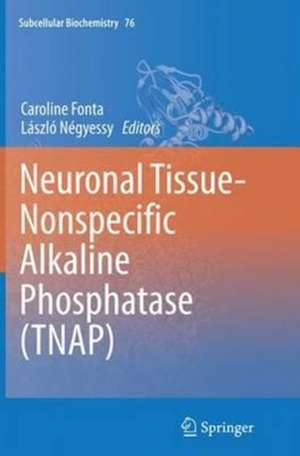Neuronal Tissue-Nonspecific Alkaline Phosphatase (TNAP): Subcellular Biochemistry, cartea 76
Editat de Caroline Fonta, László Négyessyen Limba Engleză Paperback – 23 oct 2016
| Toate formatele și edițiile | Preț | Express |
|---|---|---|
| Paperback (1) | 1306.08 lei 38-44 zile | |
| SPRINGER NETHERLANDS – 23 oct 2016 | 1306.08 lei 38-44 zile | |
| Hardback (1) | 1335.83 lei 38-44 zile | |
| SPRINGER NETHERLANDS – 7 aug 2015 | 1335.83 lei 38-44 zile |
Din seria Subcellular Biochemistry
- 18%
 Preț: 948.79 lei
Preț: 948.79 lei - 5%
 Preț: 1456.88 lei
Preț: 1456.88 lei - 18%
 Preț: 1373.84 lei
Preț: 1373.84 lei - 18%
 Preț: 1243.78 lei
Preț: 1243.78 lei - 18%
 Preț: 2098.81 lei
Preț: 2098.81 lei - 18%
 Preț: 1122.10 lei
Preț: 1122.10 lei - 5%
 Preț: 1160.63 lei
Preț: 1160.63 lei - 18%
 Preț: 1396.26 lei
Preț: 1396.26 lei - 18%
 Preț: 1114.96 lei
Preț: 1114.96 lei - 18%
 Preț: 1224.68 lei
Preț: 1224.68 lei - 18%
 Preț: 951.29 lei
Preț: 951.29 lei - 18%
 Preț: 1227.99 lei
Preț: 1227.99 lei -
 Preț: 398.15 lei
Preț: 398.15 lei -
 Preț: 399.88 lei
Preț: 399.88 lei - 18%
 Preț: 1231.47 lei
Preț: 1231.47 lei - 18%
 Preț: 1230.35 lei
Preț: 1230.35 lei -
 Preț: 392.60 lei
Preț: 392.60 lei - 18%
 Preț: 1231.47 lei
Preț: 1231.47 lei - 15%
 Preț: 638.76 lei
Preț: 638.76 lei - 5%
 Preț: 656.26 lei
Preț: 656.26 lei -
 Preț: 389.49 lei
Preț: 389.49 lei - 5%
 Preț: 659.19 lei
Preț: 659.19 lei -
 Preț: 392.37 lei
Preț: 392.37 lei - 5%
 Preț: 662.09 lei
Preț: 662.09 lei -
 Preț: 395.09 lei
Preț: 395.09 lei - 5%
 Preț: 667.99 lei
Preț: 667.99 lei -
 Preț: 400.47 lei
Preț: 400.47 lei - 18%
 Preț: 1224.54 lei
Preț: 1224.54 lei - 15%
 Preț: 647.73 lei
Preț: 647.73 lei - 15%
 Preț: 646.75 lei
Preț: 646.75 lei - 5%
 Preț: 662.30 lei
Preț: 662.30 lei -
 Preț: 395.25 lei
Preț: 395.25 lei - 18%
 Preț: 1230.21 lei
Preț: 1230.21 lei - 18%
 Preț: 1231.95 lei
Preț: 1231.95 lei - 18%
 Preț: 964.54 lei
Preț: 964.54 lei
Preț: 1306.08 lei
Preț vechi: 1374.83 lei
-5% Nou
Puncte Express: 1959
Preț estimativ în valută:
249.91€ • 260.95$ • 206.37£
249.91€ • 260.95$ • 206.37£
Carte tipărită la comandă
Livrare economică 11-17 aprilie
Preluare comenzi: 021 569.72.76
Specificații
ISBN-13: 9789402402735
ISBN-10: 940240273X
Pagini: 395
Ilustrații: XXII, 395 p. 58 illus., 37 illus. in color.
Dimensiuni: 155 x 235 mm
Ediția:Softcover reprint of the original 1st ed. 2015
Editura: SPRINGER NETHERLANDS
Colecția Springer
Seria Subcellular Biochemistry
Locul publicării:Dordrecht, Netherlands
ISBN-10: 940240273X
Pagini: 395
Ilustrații: XXII, 395 p. 58 illus., 37 illus. in color.
Dimensiuni: 155 x 235 mm
Ediția:Softcover reprint of the original 1st ed. 2015
Editura: SPRINGER NETHERLANDS
Colecția Springer
Seria Subcellular Biochemistry
Locul publicării:Dordrecht, Netherlands
Cuprins
1 Clinical forms and animal models of hypophosphatasia.- 2 Molecular genetics of hypophosphatasia and phenotype-genotype correlations.- 3 Genetically modified mice for studying TNAP function.- 4 Tissue-Nonspecific Alkaline Phosphatase in the Developing Brain and in Adult Neurogenesis.- 5 Rediscovering TNAP in the brain: a major role in regulating the function and development of the cerebral cortex.- 6 TNAP in the retina.- 7 Tissue Non-specific Alkaline Phosphatase (TNAP) in vessels of the brain.- 8 What can we learn about the neural functions of TNAP from studies on other organs and tissues?.- 9 TNAP, an essential player in membrane lipid rafts of neuronal cells.- 10 Signal transduction pathways of TNAP: molecular network analyses.- 11 Vitamin B-6 Metabolism and Interactions with TNAP.- 12 Tetramisole and levamisole suppress neuronal activity independently from their inhibitory action on Tissue Non-Specific Alkaline Phosphatase in mouse cortex.- 13 TNAP and Pain Control.- 14 Neurological symptoms of Hypophosphatasia.- 15 Recombinant enzyme replacement therapy in hypophosphatasia.- 16 Neurogenetic Aspects of Hyperphosphatasia in Mabry Syndrome.- 17 The role of tissue non-specific alkaline phosphatase (TNAP) in Neurodegenerative diseases: Alzheimer’s disease in the focus.- 18 TNAP plays a key role in neural differentiation as well as in neurodegenerative disorders.- Index
Textul de pe ultima copertă
Phosphatases such as TNAP are fundamental in regulating cellular, and consequently numerous body functions. TNAP is a ubiquitous enzyme with a wide spectrum of substrates and specificity regulation at the cellular level and the lack of TNAP activity is a lethal condition. Recent findings of a highly specific regional, laminar and subcellular localization of TNAP in the cerebral cortex indicates that in addition to its metabolic and skeletal functions, TNAP also plays a role in regulating cerebral functions, most probably cognition. In fact, TNAP disturbance could result in complex diseases such as epilepsy, developmental retardation and Alzheimer disease. Available data suggest that, regarding brain functions, TNAP is a potentially important target of clinical research. The proposed book aims to provide an overview of our current understanding of the functions of TNAP in the brain.
Caracteristici
Offers a wealth of new information on alkaline phosphatase TNAP functions in the nervous system Opens up new insights on the regulation of neural functions A valuable resource for both researchers and clinicians Includes supplementary material: sn.pub/extras





























